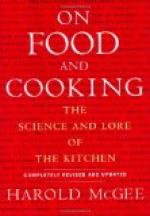“The popular notion that beef-tea and meat extracts contain the nourishing elements of meat in a concentrated form, is a dangerous error. Undoubtedly many sick persons have been starved by being fed exclusively upon these articles, which are almost wholly composed of waste substances. Prof. Paule Bernard, of Paris, found that dogs fed upon meat extracts died sooner than those which received only water.”
FOOD COMBINATIONS.—Some persons, especially those of weak digestive powers, often experience inconvenience in the use of certain foods, owing to their improper combinations with other articles. Many foods which are digested easily when partaken of alone or in harmonious combinations, create much disturbance when eaten at the same meal with several different articles of food, or with some particular article with which they are especially incompatible. The following food combinations are among the best, the relative excellence of each being indicated by the order in which they are named: Milk and grains; grains and eggs; grains and vegetables or meats; grains and fruits.
Persons with sound stomachs and vigorous digestion will seldom experience inconvenience in making use of other and more varied combinations, but dyspeptics and persons troubled with slow digestion will find it to their advantage to select from the bill of fare such articles as best accord with each other, and to avoid such combinations as fruits and vegetables, milk and vegetables, milk and meats, sugar and milk, meat or vegetables, fats with fruits, meats, or vegetables, or cooked with grains.
TABLE TOPICS.
Now good digestion waits on
appetite, and health on
both—Shakespeare.
We live not upon what we eat, but upon what we digest.—Abernethy.
If we consider the amount of ill temper, despondency, and general unhappiness which arises from want of proper digestion and assimilation of our food, it seems obviously well worth while to put forth every effort, and undergo any sacrifice, for the purpose of avoiding indigestion, with its resulting bodily ills; and yet year after year, from the cradle to the grave, we go on violating the plainest and simplest laws of health at the temptation of Cooks, caterers, and confectioners, whose share in shortening the average term of human life is probably nearly equal to that of the combined armies and navies of the world.—Richardson.
Almost every human malady
is connected, either by highway or byway,
with the stomach.—Sir
Francis Head.
It is a well-established fact that a leg of mutton caused a revolution in the affairs of Europe. Just before the battle of Leipsic, Napoleon the Great insisted on dining on boiled mutton, although his physicians warned him that it would disagree with him. The emperor’s brain resented the liberty taken with its colleague, the stomach; the monarch’s equilibrium was overturned, the battle lost, and a new page opened in history.—Sel.
Galloping consumption at the
dinner table is one of the national
disorders.—Sel.




